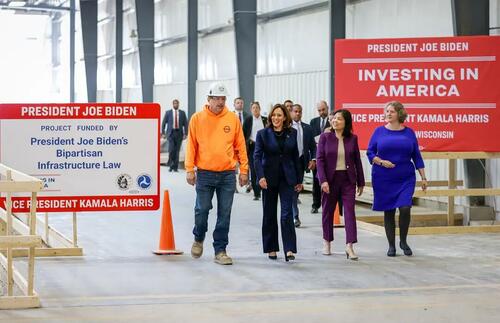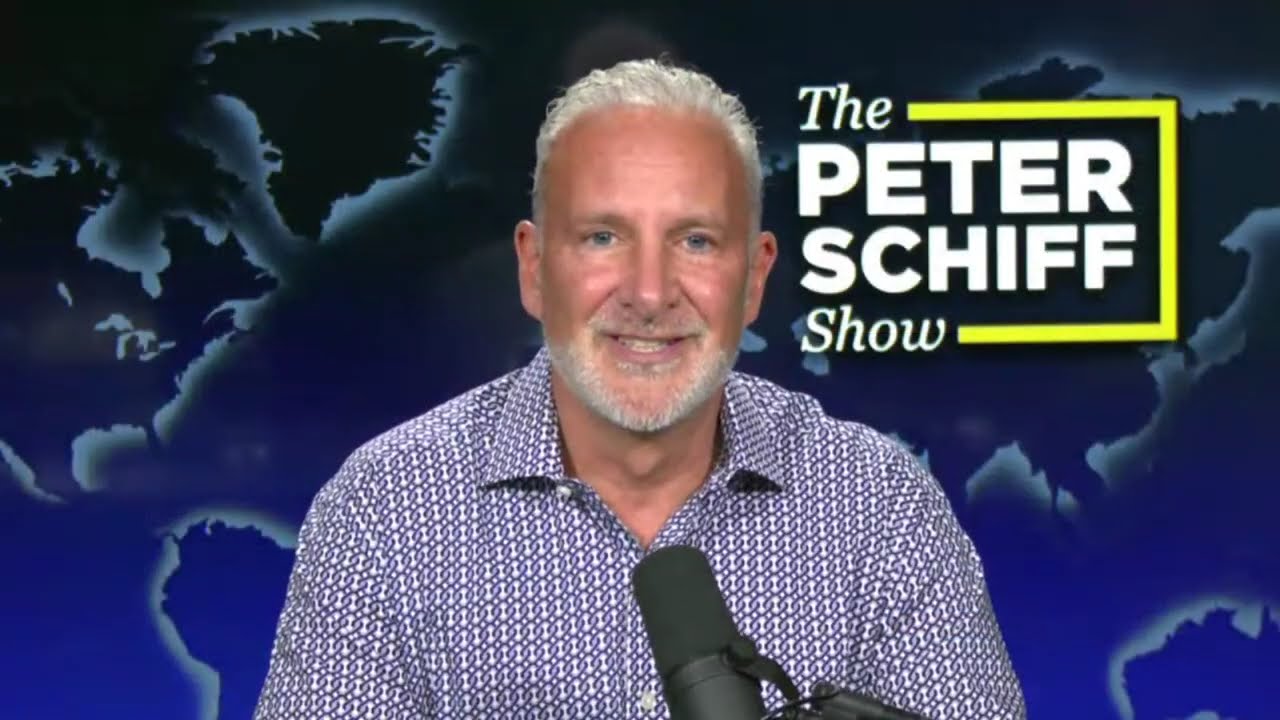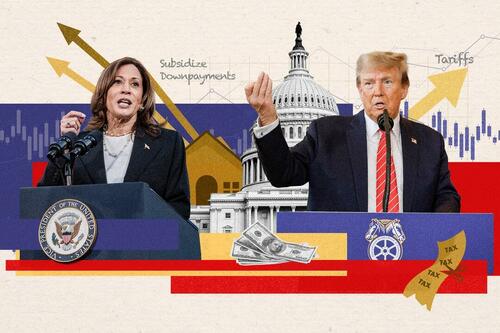Dave Smith: Will Trump Be Able To End The War In Ukraine?
Dave Smith: Will Trump Be Able To End The War In Ukraine?
At a recent pre-election speaking and podcast event, comedian and Libertarian political commentator Dave Smith expressed his view that it is very realistic that the next President Donald Trump could successfully negotiate an end to the Ukraine war.
Smith’s view is optimistic, as he articulated that he believes Trump’s expressed desire to end wars in Ukraine and Gaza is genuine. But Smith also laid out that much depends on who Trump puts around him in top national security positions. Below is the hard-hitting segment featuring the prominent commentator addressing the question: will Trump be able to end the war in Ukraine?
PBD: Will Trump be able to end the war in Ukraine?
Dave Smith: Yes, If he listens to Tucker Carlson, Bobby Kennedy, and Vivek Ramaswamy, but not if he picks Mike Pompeo, Liz Cheney’s pick for Defense Secretary, or John Bolton, Hillary Clinton’s pick for National Security Advisor pic.twitter.com/1f5kQZQEW4
— Liam McCollum (@MLiamMcCollum) November 6, 2024
Below are Dave Smith’s words from the segment on Trump and Ukraine below [emphasis ZH]…
“Why the hell are we even expanding our military alliance to Ukraine? And listen, Donald Trump always says that the war ‘never would have happened if I was president, and I would negotiate an end to this.’
And I gotta say I think he’s right about that. I don’t think the war would have happened if he was president – I think he will negotiate an end to it.
I don’t think he’s right that Hamas wouldn’t have attacked Israel if he was president – that seems kind of ridiculous to me. But he’s right: the Ukraine war could be over tomorrow if American wanted to negotiated a peace to it.
Vladimir Putin has been trying to the entire time…
Well the question becomes who does Donald Trump put around him? If Donald Trump puts Mike Pompeo, aka Liz Cheney’s pick for Defense Secretary… if he puts John Bolton, aka Hillary Clinton’s pick for national security adviser – then maybe not, maybe it doesn’t happen.
But if he listens to Tucker Carlson, and ‘Bobby’ Kennedy, and Vivek Ramaswamy, and all the smart people around him – then yes, he could negotiate an end to that war.”
* * *
Indeed, the question ultimately becomes: will Trump really keep the ‘swamp’ out of his administration this time around? We hope so.
Tyler Durden
Wed, 11/06/2024 – 18:00
Schiff: The Data Says Stagflation
Schiff: The Data Says Stagflation
On Friday Peter capped off the week by discussing the latest round of troubling data. With the nonfarm payroll report coming in far below expectations, Peter elaborates on the predicament the Fed is in. With mounting political pressure and an election in mere days, how will the Fed possibly manage both inflation and a stagnating labor market? Peter’s answer? They can’t.
During the last several months, the media and political class have insisted the economy is healthy, even if it is cooling. But disappointing economic metrics and multiple downward revisions to important data reinforce the American consumer’s intuition. The economy is not doing well:
“Voters are not necessarily fooled. That’s why so many want change – they don’t want to stay the course. They’re not buying what the media is selling about how great the Biden-Harris economy is. In fact, all the data coming out this week confirms that this is a weak economy. We’re probably in a recession. It’s stagflation, or worse—recession and inflation at the same time.”
The Fed’s gambit to cut rates and hope for the best is backfiring. The cuts have actually triggered long-term rates to rise, and the recent nonfarm payroll report is only going to make things worse:
“Rising government debt is causing bond investors to lose confidence in the Treasury’s ability to repay without creating inflation. What’s happening in the bond market is exactly what I predicted. … Today’s results offer more proof. They were expecting 125,000 jobs, but we ended up with just 12,000—well below the lowest estimate of 57,000. Plus, the prior two months were revised down.”
The Fed is stuck between inflation and a stagnating economy. The nation’s eyes are on the election, and it’s very unlikely Jerome Powell will be able to resist political pressure to start printing more money:
“The Fed’s not going to do anything about it—they can’t. In fact, they’re going to fuel the fire. They’re going to cut rates, going back to quantitative easing, because the recession is going to keep getting worse. The economy will weaken as inflation gets stronger. So what can they do? They can’t fight both; they have to pick. And all the political pressure, whether from Harris or Trump, will push them toward stimulating the economy.”
Turning to the latest campaign headlines, Peter notes that the betting market have seemingly backed off of their Trump optimism. In reality, Peter says, this fluctuation is probably the result of traders closing their positions, not a sudden loss of confidence in Trump:
“It reached about $55 a share on Tuesday and then closed barely over $30, at $30.56. DJT stock was plunging as traders took profits on DJT, covering their bets on Donald Trump and unwinding them. That’s why we saw this big move today, with Harris shooting up and Trump collapsing. It’s not that the polls really changed or that Trump is much less likely to win today than yesterday; it’s simply that those who made those bets now have an incentive to cover because they exited their trade.”
In other news, Michael Saylor’s company, MicroStrategy, is planning on purchasing over $40 billion in Bitcoin. Peter shows his literary side, comparing Saylor to the myopic Captain Ahab:
“He really is Captain Ahab, and Bitcoin is his Moby Dick. But he’s going to go down, and everyone on the ship is going down with him. Even if I were bullish on Bitcoin—I know there are people who watch this podcast and say, ‘Hey, I agree with everything Peter Schiff says, except for Bitcoin.’ So, if you really like Bitcoin, here’s what you need to do: Sell your Bitcoin now and buy it back when MicroStrategy goes bankrupt.”
Peter wraps up what may be his last podcast before the election with a sober dose of reality. Donald Trump is undoubtedly the best hope America has to fix our political dysfunction, but we shouldn’t pretend his track record is something to be proud of:
“Everybody knows I support Trump. I’ve encouraged my supporters to vote for him. But I am not going to say that his first term was an economic miracle. Now, I know people like to oversell, hype it up to get votes, but that destroys all your credibility. If we’re ever going to solve the problems that need solving, we can’t pretend that Trump’s first term was great. All the problems got worse under Trump. They would have gotten worse under Hillary too, but they got worse under Trump. Government spending increased—where’s the miracle? Trade deficits hit record highs under Trump even before COVID. … They slashed interest rates to zero, and we had massive quantitative easing. That’s the illusion that was created.”
Make sure you catch up on other news from last week with JD and Joel’s analysis on the SchiffGold Gold Wrap Podcast.
Tyler Durden
Wed, 11/06/2024 – 11:25
These Are The Countries That Believe In Aliens The Most
These Are The Countries That Believe In Aliens The Most
This graphic, via Visual Capitalist’s Marcus Lu, visualizes the results of an Ipsos poll that asked adults whether they thought aliens would visit Earth.
The survey consisted of 24,471 adults across 36 countries, conducted between October and November, 2022.
Where E.T.’s Existence Would be Most Accepted
India, Saudi Arabia, and the UAE had the highest share of respondents who believe an alien visit would be likely.
| Country | Likely (%) | No response | Unlikely |
|---|---|---|---|
| 🇮🇳 India | 43 | 17 | 40 |
| 🇸🇦 Saudi Arabia | 38 | 19 | 43 |
| 🇦🇪 UAE | 36 | 23 | 41 |
| 🇹🇭 Thailand | 29 | 25 | 46 |
| 🇨🇴 Colombia | 26 | 23 | 51 |
| 🇨🇳 China | 25 | 10 | 65 |
| 🇵🇪 Peru | 23 | 21 | 56 |
| 🇮🇩 Indonesia | 22 | 16 | 62 |
| 🇸🇬 Singapore | 22 | 21 | 57 |
| 🇲🇽 Mexico | 21 | 23 | 56 |
| 🇲🇾 Malaysia | 21 | 23 | 56 |
| 🇹🇷 Turkey | 20 | 18 | 62 |
| 🇿🇦 South Africa | 19 | 19 | 62 |
| 🇧🇷 Brazil | 19 | 18 | 63 |
| 🇨🇱 Chile | 19 | 19 | 62 |
| 🇦🇷 Argentina | 18 | 26 | 56 |
| 🇩🇰 Denmark | 18 | 11 | 71 |
| 🇺🇸 U.S. | 17 | 19 | 64 |
| 🇩🇪 Germany | 17 | 11 | 72 |
| 🇦🇺 Australia | 16 | 13 | 71 |
| 🇮🇪 Ireland | 15 | 11 | 74 |
| 🇪🇸 Spain | 15 | 17 | 68 |
| 🇸🇪 Sweden | 15 | 10 | 75 |
| 🇮🇹 Italy | 13 | 15 | 72 |
| 🇷🇴 Romania | 13 | 20 | 67 |
| 🇫🇷 France | 12 | 15 | 73 |
| 🇰🇷 South Korea | 12 | 13 | 75 |
| 🇭🇺 Hungary | 12 | 16 | 72 |
| 🇨🇦 Canada | 12 | 18 | 70 |
| 🇳🇱 Netherlands | 11 | 11 | 78 |
| 🇬🇧 UK | 10 | 12 | 78 |
| 🇨🇭 Switzerland | 10 | 13 | 77 |
| 🇮🇱 Israel | 10 | 12 | 78 |
| 🇵🇱 Poland | 10 | 14 | 76 |
| 🇧🇪 Belgium | 10 | 11 | 79 |
| 🇯🇵 Japan | 8 | 24 | 68 |
It’s hard to ascertain any one reason these three countries believe in aliens so strongly. It may be due to rich mythologies where the acceptance of various gods, djinn, and other magical beings translates into acceptance of alien life.
There might also be a religious element at play. Ongoing discussions about what the Quran states about other forms of life, except for humans, have generated interest on the internet.
It could also be an effect of mass media: the Star Wars movies, for example, were very popular in India.
However, the same influence for some countries clearly doesn’t work for others. The U.S., home to Hollywood—which seems to release at least one movie about aliens a year—sits firmly middle of the pack.
And then there’s Japan, where only 8% of those surveyed believed a visit was likely.
This is somewhat surprising, given the country’s strong technological advancements and fascination with futuristic themes in popular culture.
So… Do Aliens Exist?
NASA has said that so far, no credible evidence exists for extraterrestrial life. And despite multiple “strange light sightings,” over the years, the Department of Defense’s most recent report states there’s no “verifiable evidence” that all the “unidentified anomalous phenomena” (a new term for UFOs) actually represents alien life.
However, as a case study for probability, the odds of humans being the only advanced civilization in the whole universe is one in ten billion trillion. Or really, really, small.
So, purely mathematically, the chances of alien life existing are likely.
Now whether they’d visit—is another question entirely.
If aliens did visit, they’d probably bump into one of the many satellites hovering over the planet. Check out Operational and Planned Low Earth Orbit Internet Satellite Projects by creator MadeVisual to see which companies own what constellations.
Tyler Durden
Wed, 11/06/2024 – 04:15
Homes In SoCal’s Planned ‘City Of Kindness’ To Start In The Very Friendly $400,000s
Homes In SoCal’s Planned ‘City Of Kindness’ To Start In The Very Friendly $400,000s
Authored by Jill McLaughlin via The Epoch Times (emphasis ours),
Imagine living in a city built on kindness, where residents are encouraged to respect one another and not judge their neighbors.
John Ohanian, general manager of DMB Development, hopes to build just that—a “City of Kindness” called Silverwood in San Bernardino County.
“It’s really important to us,” Ohanian told The Epoch Times. “The idea is to create some expectations of how we’re all going to live together.”
The nearly 15-square-mile development is in Hesperia, California, on State Route 138 near the Cajon Pass in the San Bernardino Mountains, about 75 miles east of Los Angeles.
The project will offer homes built around active outdoor lifestyles and priced from the mid-$400,000s up to the $700,000s. The community will also have five elementary schools, one middle school, and one high school, according to plans.
“We’re trying to create a special place for folks to live that embraces an outdoor lifestyle and is community oriented,” Ohanian said.
With home prices far below those closer to the coast, Ohanian said the housing will be more attainable for Californians who can’t afford Los Angeles and Orange County.
“We’re trying very hard to articulate a lifestyle that is family oriented, allowing young families to be able to stay in California and afford to live here,” Ohanian said.
Living in Silverwood will also include paying $158 a month in homeowner association fees, but that will include connections to full-gig speed internet, which is 10 times faster than older cable connections, according to the developer.
Ohanian was inspired to build a community of kindness after hearing about former Anaheim Mayor Tom Tait’s “Kindness Initiative,” developed after he took office in 2010. The city officially made “kindness” its motto in 2017.
Silverwood might be just the kind of city the former mayor was hoping to inspire.

“Kindness is very simple. It’s doing something for someone else with no expectation in return,” he explained in 2017 on City Talk. “Imagine an entire city where people are just a little kinder. Where they know it’s who we are. When that happens, literally everything gets better.”
Tait did not return a request for comment about Silverwood on Friday.
In this spirit, though, Silverwood’s homeowner association would offer residents who buy one of their nearly 15,700 homes a chance to sign a pledge promising to be kind.
“We’re trying to make it feel like people have a voice, and have an opportunity to also be respected, not judged, and treated kindly,” Ohanian said. “It sets an expectation and we hope everybody who becomes a homeowner signs a pledge.”
Kindness won’t be enforced, but Ohanian said he hoped peer pressure and conscience would drive residents to enforce the idea themselves.
The project has been in the works since 2012, when the developer purchased the land out of a bankruptcy. The southern edge of the property was a working cattle ranch and will remain open space.
The lower cost of the land is part of what will allow the developer to offer more affordable houses. The homes will range from 1,400 square feet for a one-story condo close to the town’s center, up to 4,000-square-foot executive homes at the higher end.

“Silverwood will create the opportunity for thousands of families to live in a gorgeous natural setting with endless opportunities for outdoor recreation, all within a reasonable commute to San Bernardino, Riverside, Ontario, and other existing employment hubs,” according to the project’s website.
Each house will also come with solar panels, which are now required by California law.
The development will also build a wastewater treatment facility that will allow the association to use recycled water for all parks and schools. Half of the houses will also be built to offer homeowners the ability to use recycled water for irrigation and landscaping, according to the developer.
The project is planned to include eight villages, each with its own theme and anchored by a green space. One might be built around pickleball courts, while another might have a swimming complex, according to the developer.
“Each village will have their own neighborhood identity and each of them will have their own character,” Ohanian said.
The community will also have its own medical services, grocery stores, and other services, he added.
People will be able to gather at the pools, recreational facilities, bandstands, and other areas, according to the developer. Nearly half of the land in the development has been set aside for natural open space, conservation easement, parks, and the Serrano Preserve.
The project is expected to include 59 miles of off-street trails, 107 miles of paths and paseos, and 387 acres of parks. Every house will be within a five-minute walk of a park, according to plans.
Silverwood Lake is on the southern boundary of the property, and Lake Arrowhead and Big Bear are about an hour away.

Model homes at the development should be open in the spring of next year, Ohanian said. He expects to have people living in the community between April and June.
Home builders include Lennar, Richmond American Homes, Watt Capital Developers, and Woodside Homes.
The developer expects to take up to 20 years to completely build out the community.
Tyler Durden
Tue, 11/05/2024 – 22:20
Voting On Election Day? Here’s Everything You Need To Know
Voting On Election Day? Here’s Everything You Need To Know
Authored by Samantha Flom via The Epoch Times (emphasis ours),
Early voting has exploded in popularity in the wake of the COVID-19 pandemic, but some voters still prefer to cast their ballots in person on Election Day.
For those preparing to join those lines, here are the answers to some common questions they might have.
When Is Election Day?
Election Day is Tuesday, Nov. 5.
Am I Eligible to Vote?
Only U.S. citizens ages 18 or older are permitted to vote in federal elections.
Additionally, all states and territories except North Dakota require voter registration.
Each state has its own registration deadline, though some offer same-day registration or conditional registration and provisional ballots for those who missed the cutoff.
Voters can check the status of their registration here. A list of state registration deadlines and policies can be found here.
Where Do I Vote?
Verify your polling location and the hours it will be open with your local elections office.
Do I Need ID?
Most states either require or request that voters present some form of identification to vote in person, though rules vary.
Some states require that voters present a valid photo ID at the polls to vote. Others allow voters to present other identifying documents, such as a birth certificate, current utility bill, bank statement, paycheck, or government-issued document that shows the individual’s name and address.
In some cases, voters may be allowed to vote without showing any form of identification.
Confirm your state’s requirements here.
Who’s on the Ballot?
All eyes will be on the presidential race between Vice President Kamala Harris, the Democrat nominee, and Republican candidate former President Donald Trump. But with control of Congress hanging in the balance, pundits will also be watching several House and Senate races closely to see which way the pendulum swings.
Toss-up Senate races in Michigan, Ohio, Pennsylvania, and Wisconsin will receive plenty of attention as the night progresses. So will Montana’s contest, where three-term Democrat Sen. Jon Tester is expected to lose his seat to Republican newcomer Tim Sheehy.
Sens. Ted Cruz (R-Texas), Deb Fischer (R-Neb.), and Jacky Rosen (D-Nev.) are also defending their seats, while Arizona’s Democrat Rep. Ruben Gallego (D-Ariz.) will face off against former Republican gubernatorial candidate Kari Lake in the race to replace Sen. Kyrsten Sinema (I-Ariz.).
In the House, every seat is up for grabs. The Epoch Times has identified 20 races that could decide control of the chamber.
When Will We Know Results? (lol)
It’s unlikely that every race will be decided on election night thanks to the post-pandemic popularity of voting by mail.
State deadlines vary for returning absentee ballots, as do the times when officials may start processing and counting them.
In Arizona, for instance, officials may count absentee ballots immediately upon receipt, though they must be received by the elections office by 7 p.m. MST on Election Day.
In Illinois, ballots can be received and counted as late as 14 days after the election, provided that they are postmarked by Election Day. Officials begin the counting process after the polls close.
Verify your state’s ballot return deadlines here or with your elections office.
The U.S. Postal Service encourages those voting by mail to mail their completed ballots before Election Day and at least one week before their state’s deadline to ensure their vote is counted.
How Do I Report Election Integrity Issues?
If you suspect voter or election fraud has occurred, report it to your local elections office.
Other authorities you may contact include a local FBI office, U.S. attorney’s office, or the Public Integrity Section of the Department of Justice’s Criminal Division.
The Department of Justice also has an online form through which voters may report incidents of voter suppression or intimidation.
Tyler Durden
Tue, 11/05/2024 – 07:20
Netanyahu Aide Arrested Over Intel Leak Which Damaged Ceasefire Talks
Netanyahu Aide Arrested Over Intel Leak Which Damaged Ceasefire Talks
Israeli police have arrested a top aide to Prime Minister Benjamin Netanyahu, and four others for allegedly leaking classified information to foreign media, court documents released on Sunday revealed. The intelligence allegedly claimed Hamas was planning to smuggle Israeli captives from Gaza to Egypt.
Opposition leaders say the intelligence was leaked to take pressure off Netanyahu to reach a ceasefire deal with Hamas that would bring home the roughly 100 Israeli captives still held by the Palestinian resistance movement. It is estimated that roughly 70 remain alive.
Netanyahu has repeatedly sabotaged ceasefire talks with Hamas since the start of the war on October 7 last year, despite heavy pressure from the families of the captives to reach a deal.
Court documents released on Sunday identified Eliezer Feldstein, an aide to Netanyahu, as one of several people being detained and interrogated over the leak of “classified and sensitive intelligence information.” The names of the other four detained persons have not been cleared for publication by Israel’s military censors.
The intelligence was leaked to two foreign media outlets, the Jewish Chronicle in the UK and Bild in Germany, both of which published stories about the leaked intelligence. The Jewish Chronicle later retracted its story.
The court documents said that information taken from the Israeli military’s systems and “illegally issued” may have damaged Israel’s ability to free the captives held by Hamas in Gaza.
Opposition leader Yair Lapid on Sunday accused the prime minister’s office of leaking “faked secret documents to torpedo the possibility of a hostage deal – to shape a public opinion influence operation against the hostages’ families.”
By claiming that Hamas leader Yahya Sinwar was planning to flee to Egypt with the captives, the leaked documents appeared to promote Netanyahu’s claim in the minds of the Israeli public that any ceasefire deal must allow Israel to keep its forces on the Philadelphia Corridor, which runs along the Gaza-Egypt border.
Otherwise, the captives could end up in Egypt’s Sinai or “pop up in Iran or Yemen,” Netanyahu claimed.
Netanyahu added the demand that Israel be allowed to continue occupying the Philadelphia Corridor in the 11th hour of negotiations for a ceasefire this summer. The demand torpedoed the talks, as Hamas has long insisted on a full Israeli withdrawal from Gaza as part of any ceasefire deal.
The issue with the leaks from Netanyahu’s office is that intelligence assets may have been burned not for military purposes but for PR or politicking, @da64 tells @laura_i24 pic.twitter.com/vFs4LNEI7h
— i24NEWS English (@i24NEWS_EN) November 4, 2024
Members of the Likud, Religious Zionism, and Jewish Power parties, which comprise Netanyahu’s governing coalition, have stated it is their priority to continue the war. They hope to ethnically cleanse Gaza and annex it, ideally to build Jewish settlements atop destroyed Palestinian cities.
Israeli soldiers have stated the army is currently carrying out the so-called “Generals’ Plan” to forcibly expel the remaining 300,000 residents in northern Gaza and move them to the south of the strip. The plan calls for starving or killing any militants or Palestinian civilians who refuse or are unable to leave.
Tyler Durden
Mon, 11/04/2024 – 23:00
RFK Jr Says Trump Plans To Remove Fluoride From American Drinking Water
RFK Jr Says Trump Plans To Remove Fluoride From American Drinking Water
The debate over the forced medication of the American population by the government is a long standing conflict. Today it is more important than ever after the draconian efforts of Democrats to create a path to forced covid vaccinations using economic coercion. The fight over experimental mRNA vaccines and vaccine passports has had an interesting side effect – The public is now motivated to question many other medical mandates and FDA standards with suspicious origins.
Water fluoridation is one of those standards.
Robert F. Kennedy Jr, now part of Donal Trump’s campaign dream team, is to be put in charge of US health initiatives should Trump win the election this week. Kennedy’s secondary career focus (beyond politics) has been exposing faulty medical establishment practices and food industry corruption. He was a stalwart opponent of covid mandates and forced vaccination attempts and it’s fair to say he is widely hated by the government funded medical elite and the media.
Kennedy announced this week that he has turned his sights on water fluoridation, and says Donald Trump plans to set policies in motion to end fluoridation if he returns to office.
On January 20, the Trump White House will advise all U.S. water systems to remove fluoride from public water. Fluoride is an industrial waste associated with arthritis, bone fractures, bone cancer, IQ loss, neurodevelopmental disorders, and thyroid disease. President…
— Robert F. Kennedy Jr (@RobertKennedyJr) November 2, 2024
Fluoridation of the US water supply has been a key battleground since it began in 1945. The practice was not widely accepted by the scientific community or the dental community back then, but that was before government manipulation of medical and scientific research through subsidies became a standard.
After a few decades of indoctrination in universities and the growing habit of the medical community to police its own when it comes to investigating certain subjects, very few researchers had the courage to publish evidence contrary to the narrative that fluoride in the water supply was anything other safe.
To question fluoride treatment is almost as taboo as questioning climate change if you are a scientist. It’s just not done, but that attitude is completely contrary to the scientific method. Try to study the subject online and most search engines will bury you in hundreds of “Fact Check” articles claiming that questioning fluoridation is pure conspiracy theory.
The early days of mass fluoride medication are as shady as any conspiracy could possibly be. Rumors of fluoride testing on unwilling subjects by the Third Reich and the Soviets abound, but there is little concrete evidence to confirm the claims that this was done to “control the population.” The Soviets did in fact pass a directive in the 1960s for mass fluoridation of the water supply, and this ended in the 1990s. The reason why is not officially admitted.
The theory was that the chemical caused docile behavior and reduced IQ, making the population easier for the elites to manage and control.
Here are the facts:
1) Fluoride (or sodium fluoride) is a toxic chemical byproduct of the aluminum and fertilizer industry often used in rat poison. It is also a cumulative agent, which means it continues to collect in the human body over time when ingested.
2) Initially, these industries pumped fluoride gases into the air, causing health concerns and lawsuits. This forced the manufacturers to capture the gases and reduce them down to a chemical sludge. This is then distilled into a powder which makes it easier to contain and transport. The problem was, the chemical was expensive to dispose of safely under environmental protocols.
3) Trace elements of natural fluoride already exist in many water supplies. In some places with higher fluoride content in ground water in the early 1900s, residents were found to suffer from a condition called “brown teeth”. Scientists also found that people with brown teeth also had lower instances of cavities. Eventually a correlation to fluoride was established by a man named Trendley H. Dean.
4) Dean, a dentist and scientist, ultimately led the charge for mass fluoridation in US cities. Another entity also lobbied the government for mass fluoridation: Aluminum giant Alcoa.
5) And here’s where it gets shady – Trendley Dean worked for the NIH and the Public Health Service, which was run by Andrew Mellon.
6) Wealthy elitist Andrew Mellon, a founder of ALCOA and one of its major stockholders, was the U.S. Treasury Secretary from 1921-1932, when the PHS was still a division of the Treasury Department. It was therefore Mellon’s PHS that ordered Dean to study fluoride in the first place. In other words, Mellon and Alcoa had Dean conjure up the very studies that would change fluoride from a toxic waste into a public health miracle.
7) This is yet another example of the revolving door between corporations and government health agencies.
8) Not only did industry magnates no longer have to pay for expensive chemical disposal for fluoride, they stood to make millions selling the poison to the government for water treatment. After that, the medical community (under Mellon) hyped up fluoridation as a magical cure for bad teeth.
9) Dozens of recent studies now confirm what many people suspected decades ago: Fluoride does in fact decrease IQ. Children are especially vulnerable. It is also proven to cause weaker bones, thyroid problems and a host of neurological issues. Several published articles have postulated that fluoride could be producing alterations in mitochondrial DNA; mitochondrial DNA has many implications in various mental disorders.
10) Federal Courts have ruled against the EPA in the forced fluoridation of water. They have ordered officials to take action over concerns about potential health risks from currently recommended levels of fluoride in the American drinking water supply.
11) Trendley Dean claimed that tooth decay was reduced by 60% in his studies on fluoride. More recent studies claim a more modest 15% to 25% reduction.
12) Around 70% of US communities fluoridate. Communities that have stopped fluoridation have not experienced a significant increase in dental decay.
Even if fluoride does have legitimate value as a treatment for tooth decay, this is ultimately irrelevant. The dangers involved in using the toxic chemical in public water far outweigh the potential benefits. The suspicious history of the practice also needs to be investigated. It is better to err on the side of caution and not lace our water supply with an industrial waste product.
Plenty of alternatives exist in our modern era for healthy teeth. Beyond that, the government should not be given authority to mass medicate the population. Politicians are not qualified enough or trustworthy enough to make such decisions. Ask yourself, is the government really that concerned about your teeth, or is something else going on?
Tyler Durden
Mon, 11/04/2024 – 18:00
Next US President To Face Slowing Economy, Experts Warn
Next US President To Face Slowing Economy, Experts Warn
Authored by Petr Svab via The Epoch Times (emphasis ours),
Regardless of who wins the election, the next president likely will have to deal with an economic slowdown next year, several experts told The Epoch Times. The government may try to intervene, but there’s a risk any remedies will cause harm, they said.
On paper, the U.S. economy is chugging along nicely. Unemployment is low, the markets are up, and the gross domestic product (GDP) came in 3 percent above inflation in the second quarter. Third-quarter GDP is expected to climb 2.6 percent above inflation, and median wages increased by nearly 2.5 percent (adjusted for inflation) over the past two years.
Yet, a large proportion of Americans don’t feel like the economy is working well for them.
Only about 21 percent consider business conditions “good”—a far cry from the nearly 40 percent who thought so five years ago, according to Consumer Confidence Index surveys. Self-reported family financial situation has virtually stagnated for the past year, the survey shows. Meanwhile, credit card debt is up about 16 percent over the past two years.
Economic indicators likely won’t remain as encouraging for long, said Lance Roberts, the chief investment strategist at RIA Advisors.
“I think you’re going to start looking at much lower rates of economic growth somewhere sub-2 percent growth as consumers become challenged by making ends meet,” he said.
Steve Hanke, professor of Applied Economics at The Johns Hopkins University in Baltimore, shared a similar concern.
“The economy is running on fumes and is bound to slow down,” he said via email, pointing to the shrinking of money supply in 2022–2023 that has since only partly reversed.
Since the establishment of the Federal Reserve in 1913, “there have only been four such contractions: 1920–21, 1929–33, 1937–38, and 1948–49. Three were associated with recessions, and the 1929–33 contraction resulted in the Great Depression,” Hanke said.
Financial markets should brace for a similar slowdown, according to Adam Taggart, founder of Thoughtful Money, a financial education firm.
In recent weeks, Taggart spoke to more than a dozen market analysts and noticed there’s an unusually wide disagreement on the market direction.
His best suggestion is to follow the global liquidity model produced by Michael Howell, chief executive of CrossBorder Capital, a London-based market research firm.
The model indicates that bull and bear markets in today’s economy trace liquidity: how much money is in the system overall. Howell posits that liquidity waxes and wanes in cycles. Right now, he says the market is in an upward cycle that’s likely to peak next year, signaling a slowdown.
“Just like when you throw a ball up in the air as it gets close to its apex, its speed of rise is declining,” Taggart said.
Market predictions, however, assume that “everything remains status quo next year,” Roberts noted.

As the economy slows down, letting a large number of Americans descend into poverty would be politically indigestible for whoever becomes the president. It would be expected for the administration to intervene, he suggested.
Taggart concurred.
“The system will do everything it can to fight it,” he said.
How that may happen would partly depend on who wins.
If Vice President Kamala Harris is elected and gets Congress on her side, her plan would be to institute a series of government programs, such as to finance public housing and subsidize downpayments for first-home buyers.
“That’s very inflationary,” Roberts said.
The programs would be at least partly financed through increased taxes on higher earners, which could offset the impact on government deficit. But that’s not the main issue, as Roberts explained.
“Once you start providing capital to people to go buy stuff, that massively increases the demand on the available supply,” he said.
Housing construction can’t be increased at will due to a limited number of people skilled to build them.
“You’re trying to solve a housing problem; you’re going to massively create one at that point,” Roberts said.
“If we give $25,000 to three million people to go buy houses, there’s not enough houses to buy, and they can’t build them that fast. So that’s going to be very inflationary.”

Not only would housing prices rise but also construction labor, commodities, and transportation, which all are tied to the housing supply chain, Roberts said.
If former President Donald Trump wins and gets Congress on his side, his plan would be to cut taxes, increase domestic energy production, cut regulations, and impose tariffs on imports.
Cutting taxes and regulations stimulates the economy, as does cheaper energy. Tariffs, on the other hand, could create problems, Roberts said.
Even if the tariffs are calibrated to minimize impact on domestic prices, they would “put pressure on foreign trading partners,” he said.
“It’s certainly going to ramp up a lot of the rhetoric in the market … That’s going to make the markets nervous at that point, depending on how aggressive these tariffs are.”
That has real economic impact as nervous investors are more hesitant to invest.
He also suggested Trump would press the Federal Reserve to “cut rates more aggressively.”
“The Fed’s not going to respond to that, but it’s going to give a lot of rhetoric to the markets,” he said.
“So you potentially get an environment next year where you get a bit stronger growth, but a lot more volatility—both in markets as well as the economic data.”
Taggart was skeptical that either administration would be able to cut deficits on a meaningful scale.
Hanke agreed.
“I think either administration will embrace the newfound economic religion: spend, spend, spend—with Harris pouring even more coals on the fire than Trump,” he said.
Split Congress Scenario
It could easily happen that whichever candidate wins, she or he won’t get majority in both chambers of Congress. In that case, the Congress would likely remain gridlocked, with neither party getting its way. Government spending would stay in an autopilot mode of about 8 percent annual increases, Roberts said.
“That’s the best outcome for the markets. It’s probably the best outcome for the economy, because nothing actually happens that causes a potential unexpected shock to markets.”
Read the rest here…
Tyler Durden
Mon, 11/04/2024 – 07:20
Losing Power? The Elites And The Leftist Mob Would Rather Burn It All To the Ground
By Brandon Smith It’s been a long time since we’ve seen a significant positive evolution within American society. In the…
The post Losing Power? The Elites And The Leftist Mob Would Rather Burn It All To the Ground appeared first on Alt-Market.us.
“An Existential Race Amongst The Great Powers Accelerates, At The Dawn Of The AI Age”
“An Existential Race Amongst The Great Powers Accelerates, At The Dawn Of The AI Age”
By Eric Peters, CIO of One River Asset Management
“In the global competition on AI, the alleged role of a single, and outdated, version of an American open-source model is irrelevant when we know China is already investing more than one-trillion dollars to surpass the US on AI,” said a Meta spokesperson, defending itself against an allegation.
The Jamestown Foundation had released an academic paper [here] with the following claim: “The military and security sectors within the People’s Republic of China are increasingly focused on integrating advanced AI technologies into operational capabilities. Meta’s open-source model Llama (Large Language Model Meta AI) has emerged as a preferred model on which to build out features tailored for military and security applications. In this way, US and US-derived technology is being deployed as a tool to enhance the PRC’s military modernization and domestic innovation efforts, with direct consequences for the United States and its allies and partners.”
The report also stated: “In September, the former deputy director of the Academy of Military Sciences (AMS), Lieutenant General He Lei, called for the United Nations to establish restrictions on the application of artificial intelligence (AI) in warfare. This would suggest that Beijing has an interest in mitigating the risks associated with military AI. Instead, the opposite is true. The People’s Republic of China is currently leveraging AI to enhance its own military capabilities and strategic advantages and is using Western technology to do so.”
As the world waited for America to choose its next commander-in-chief, I spent the week thinking about security matters.
“The number of different categories of space weapons that China has created and the speed with which they’re doing it is very threatening,” warned General Chance Saltzman, head of space operations for the US Space Force, as an existential race amongst the great powers accelerates, at the dawn of the AI Age.
Tyler Durden
Sun, 11/03/2024 – 23:20














